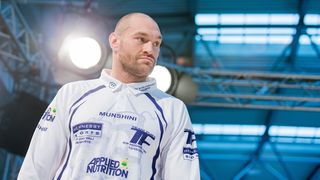Why Legalising Performance-Enhancing Drugs Is Madness
Some athletes and commentators think we should end the ban. Really? That will literally kill people, says Joel Snape

Here’s a little thought experiment. Imagine you’ve got a son – let’s call him Kanye – and he really loves, ooh, let’s say rugby. “I’m going to play for England one day, daddy,” he tells you, tiny face shining with joy after his debut game for the school’s first XV. “Of course you are, you little scamp,” you say, ruffling his hair as you think about all the driving to games you’ll do, the Saturday mornings you’ll give up, the kit you’ll have to wash (you’re a modern guy, after all) – it’ll all be worth it, almost definitely.
“Great!” says little Kanye, beaming up at you like you’re both part of the best ever John Lewis advert. “So, listen: I’m going to need you to source me some human growth hormone and maybe some EPO. All the other kids are already taking it.’
This, in a nutshell, is why you can’t legalise drugs in sport. As methods of taking them get more sophisticated and widespread – and governing bodies struggle to keep up – calling for a playing-field-levelling free-for-all is becoming an increasingly popular stance to take.
Heavyweight boxer Tyson Fury, for instance, is the latest to lead the charge – asserting that while he’s never taken drugs *himself*, he’d be open to making drugs “totally legal”, and that it would make things “fully fair”. Simon Jenkins, the social commentator and former editor of the Times, thinks we should have two sorts of athletics contests – one doped, one clean. How he’d stop doped athletes from entering (and winning) the “clean” games isn’t clear (or mentioned), but he’s also keen to point out that performance-enhancing drugs (PEDs), like recreational ones, are now so prevalent that fighting them feels like standing against the tide. You can’t do anything, goes the logic – so why even bother?
Here’s why: because that’s going to kill a lot of people. People take PEDs because they work, not as a lifestyle choice. If they’re made legal, it’ll become impossible to succeed in athletics (and much, much harder in more skill-based sports, like boxing) without them. At that point, the question becomes what you’re prepared to do if you want to win – and the answer from pro athletes, who are mainly in the job because they’re so ferociously competitive in the first place, tends to be “a lot”.
In at least one study, athletes have said they'd happily lose five years of their lives to win a gold medal, and this isn’t just abstract thinking. More than one young pro cyclist has died in the night from an unexpected heart attack, which would be unlikely in an athlete who wasn’t taking EPO. You could argue that athletes should be allowed to take hGH, or steroids, or EPO up to pre-agreed “safe” limits, but then you’re back to the problem of enforcement – someone’s always going to take more than the legal dose, and they’re probably going to win.
And if there are no limits at all, it’s a race to the bottom. If there are no rules, any country desperate for gold medals is going to start injecting its children with bovine growth hormone, while Team GB (hopefully, if you think about it) is forced off the victory table for good.
Get the Coach Newsletter
Sign up for workout ideas, training advice, reviews of the latest gear and more.
What can be done? It’s tough to say. The biological passport system being used in pro cycling is one avenue to explore, and cooperation between law enforcement authorities and WADA (currently happening on a large scale in China) might help. So would spending more money on testing. It’s a difficult fight, and it’ll probably never be fully won – but that doesn’t mean giving up entirely is the sanest option. If you start getting tempted to believe that, then think of little Kanye.
From 2008 to 2018, Joel worked for Men's Fitness, which predated, and then shared a website with, Coach. Though he spent years running the hills of Bath, he’s since ditched his trainers for a succession of Converse high-tops, since they’re better suited to his love of pulling vans, lifting cars, and hefting logs in a succession of strongman competitions.

